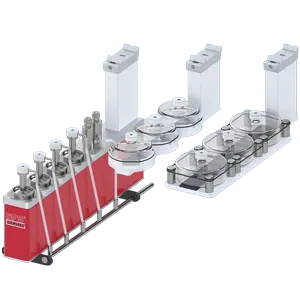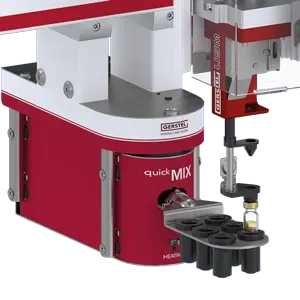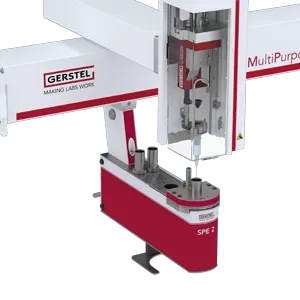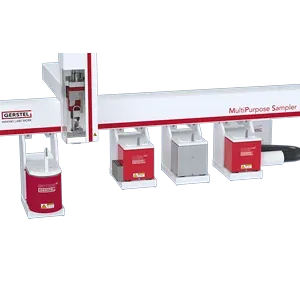
Overview Automated sample preparation
Precise analysis results by automated and standardized sample preparation
Sample preparation is an essential step in any chemical analysis procedure. The samples that are present once sampling has taken place are mostly unsuitable for the purpose of performing instrumental analysis methods upon them.
All sample preparation steps are also susceptible to random and systematic errors. As far as their size is concerned, these are larger than the samples used in the analysis itself. Major errors involving percentages in double figures as a result of analyte loss or contamination are to expected if work is carried out without the necessary degree of care and without the use of internal standards.
This is the reason why automating these procedures is of such major importance. By applying automated and standardized work techniques, sample preparation errors can largely be avoided.
Liquid Handling
The manual transfer of liquid samples forms part of the everyday work of an analytical laboratory, so the precision of the transfer plays a decisive part in the quality of the analysis results. Liquids characterized by their low boiling point or high viscosity therefore pose a number of challenges when it is a matter of transferring the required volumes as precisely and exactly as possible, as is the case when preparing calibration standards and quality control samples. Furthermore, additional sample preparation steps such as filtration, incubation or centrifugation must also be incorporated into the processes.
Transfers of this type, along with the associated sample preparation steps can be automated using a GERSTEL MultiPurposeSampler (MPS). This ensures that the resulting data are of high quality and does away with the need for analysts to perform laborious manual tasks in which there is no tolerance for error. In addition to a large number of features to facilitate the transfer of liquids, the autosampler functions controlled by the MAESTRO software also include additional techniques, such as tempering, filtration, mixing, shaking, incubation, evaporation or centrifugation. An analytical balance to verify the weight of the liquid transfer can even be incorporated. The autosampler can be configured as part of a gas chromatography (GC) or liquid chromatography (LC) system or can be used independently as a bench-top workstation.
Liquid-liquid extraction
Liquid-liquid extraction, a technique that originated in preparatory chemistry, is a separation method that utilizes differences in the solubility of substances in two immiscible solvents. The solvents used take the form of one hydrophilic phase (in most cases, water) and a hydrophobic organic solvent. The first step involves the mixing of the two phases in order to enable the substance of the product to pass from one solvent into the other. The second step involves the separation of the two liquid phases from each other, while in a third step, the solvent is then separated from the product.
During sample preparation, this is performed with the aim of transferring the analytes from a mostly complex matrix into a solvent that is as pure as possible and to enrich it there. The latter will be successful, if, for example, the selected volume of the solvent is smaller than that of the liquid sample. This is generally performed manually and is labor-intensive.
The GERSTEL MultiPurposeSampler (MPS) with its versatile optional modules enables even the most complex liquid/liquid extractions to be performed automatically. This also minimizes the exposure of laboratory personnel to potentially hazardous organic solvents and reduces the amount of work required. The steps can be combined individually and combined with various sample preparation modules of the MPS, so that the final step can consist of direct injection into a connected analysis system.
Solid Phase Extraction SPE
Solid Phase Extraction (SPE) is one of the most frequently used sample preparation techniques in analytical chromatography. It is a procedure for the enrichment and purification of analytes. Generally speaking, a liquid sample is directed above a bed containing an adsorbent medium, which is used to hold back and concentrate the target analytes, thereby removing any interference that may be caused by the sample matrix. Alternatively, this process can also be performed the opposite way around. The adsorbent medium is then used to hold back the interferences, while the target analytes are allowed to pass. When performed manually, solid phase extraction can however be laborious and time-consuming and there is an increasing need for SPE methods to be automated.
Using the GERSTEL MultiPurposeSampler (MPS) and its many optional modules, all steps that form part of manual solid phase extraction can be performed. This also includes dispersive SPE techniques, such as QuECheRS or Disposable Pipette Extraction (DPX). The steps can be combined individually, so that the solid phase extraction process can be adapted to the analytical requirements in each case, right through to the injection of the eluate into the connected analysis system. Automating the solid phase extraction process in this way using the MPS makes it possible to achieve precise and reproducible results in less time.
As far as High Performance Liquid Chromatography (HPLC) is concerned, the GERSTEL SPExos, an online SPE system with automatic cartridge exchange, is also available. SPExos allows the classical SPE process to be miniaturized and can be fully incorporated within the HPLC process. This enables 100% of the eluate to be transferred directly to the liquid chromatography column (LC column) and allows for the very lowest limits of detection to be achieved without evaporation.
Derivatization
In analytical chemistry, derivatization refers to the chemical modification of a substance, in order to change its chemical or physical properties for purposes such as making it more accessible to chromatography or mass spectrometry. During this process, strong polar groups are converted into less polar groups. The derivatives formed are characterized by an increased volatility and by a greater thermal stability, but many derivatization methods suffer from the problem of degradation once derivatization has taken place. The challenge specifically lies in the time differences between the time at which the samples are derivatized and the injection of the first and of all subsequent samples into the analysis system. In the case of larger batches, this time delay between the first and final sample can lead to considerable degradation and alteration of the chromatographic data.
Using a GERSTEL MultiPurposeSampler (MPS) enables the derivatization of samples to be automated and performed on an “in time” basis. This not only improves the quality and reliability of the data generated, but it also reduces the time taken while enabling an increased capacity of samples to be processed.




